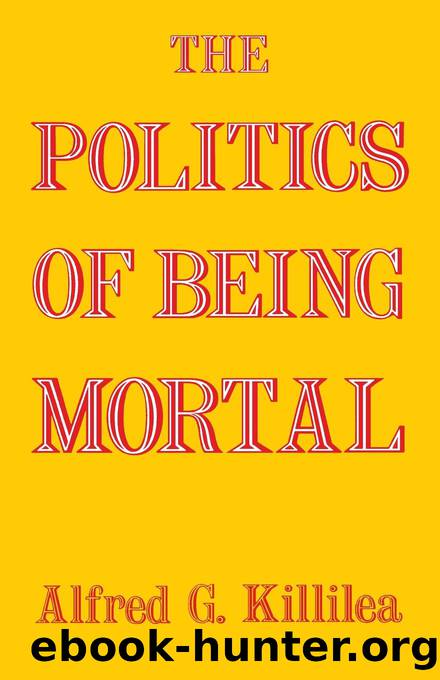The Politics of Being Mortal by Killilea Alfred G.;

Author:Killilea, Alfred G.; [Killilea, Alfred G.]
Language: eng
Format: epub
Publisher: University Press of Kentucky
Published: 2021-08-15T00:00:00+00:00
6. Death and Politics
The Road to Narcissism and Back
She thought she would live forever, but forever always ends.
âLinda Thompson
The analysis of Michael Novakâs defense of the spirit of democratic capitalism shows that the crisis of spirit and public values that bedevils contemporary culture and that provides the context for a change in attitudes toward death has no arbitrary or accidental origin. His inability to isolate the economic and cultural realms in our society or to mitigate capitalist appeals to competition and greed with images of cooperativeness only underlines the extent to which contemporary hedonism is but a full flowering of the denial of limits in capitalist thinkers from Locke on. The treatment of capitalism and contemporary values by Daniel Bell and Christopher Lasch further supports this description of the cultural setting. Lasch more clearly connects the increasing isolation and self-absorption in our society to an inability to deal with death and aging, but this linkage is also consistent with key parts of Bellâs examination of the problems and needs of our culture.
Michael Novak acknowledges that his division of society into three separate realms is inspired by Daniel Bellâs thought. In The Cultural Contradictions of Capitalism and other works, Bell does try to make the case for the disjunction of economic and cultural developments. But this disjunction in Bell is not as firm as it becomes in Novak, and in several key places Bell allows that the disjunction is fuzzy. Moreover, Bellâs arguments that appear to support Novakâs defense of capitalism against the charge that it is responsible for contemporary hedonism are among his weakest. Most important, the changes Bell sees as necessary if our society is not to become totally demoralized cut deeply into Novakâs confidence that capitalism is a solution rather than a problem. Bellâs changes definitely require transcending the moral flaws of capitalism and, indeed, constitute a ringing endorsement of the changes that could be produced by a new acceptance of human mortality.
Bell underlines the relevance of our effort when he observes in The Cultural Contradictions of Capitalism that culture is centrally concerned with âhow one meets death.â1 Bellâs description of the interplay of economics and culture is learned, fascinating, and merits extensive summation and analysis. Basically, he disagrees with Hegelians and Marxists, who have a holistic view of society, and argues that society is not integral but disjunctive. He divides society into three distinct realms, the techno-economic structure, the polity, and the culture. Bell sees the economic order as organizing the production and the allocation of goods and services and framing the occupations and stratification systems of the society. By culture, he means expressive symbolism: those efforts in painting, poetry, and fiction, or in the religious forms of litany, liturgy, and ritual that seek to explore and express the meanings of human existence in some imaginative form. These realms have different rhythms of change; they follow different norms, which legitimate different, sometimes contrasting, types of behavior. The discordances among these realms are responsible for the contradictions within society.
Download
This site does not store any files on its server. We only index and link to content provided by other sites. Please contact the content providers to delete copyright contents if any and email us, we'll remove relevant links or contents immediately.
| Anarchism | Communism & Socialism |
| Conservatism & Liberalism | Democracy |
| Fascism | Libertarianism |
| Nationalism | Radicalism |
| Utopian |
The Secret History by Donna Tartt(18143)
The Social Justice Warrior Handbook by Lisa De Pasquale(11950)
Thirteen Reasons Why by Jay Asher(8441)
This Is How You Lose Her by Junot Diaz(6428)
Weapons of Math Destruction by Cathy O'Neil(5820)
Zero to One by Peter Thiel(5484)
Beartown by Fredrik Backman(5343)
The Myth of the Strong Leader by Archie Brown(5235)
The Fire Next Time by James Baldwin(5013)
How Democracies Die by Steven Levitsky & Daniel Ziblatt(4950)
Promise Me, Dad by Joe Biden(4907)
Stone's Rules by Roger Stone(4851)
100 Deadly Skills by Clint Emerson(4683)
A Higher Loyalty: Truth, Lies, and Leadership by James Comey(4546)
Rise and Kill First by Ronen Bergman(4542)
Secrecy World by Jake Bernstein(4384)
The David Icke Guide to the Global Conspiracy (and how to end it) by David Icke(4376)
The Farm by Tom Rob Smith(4320)
The Doomsday Machine by Daniel Ellsberg(4240)
